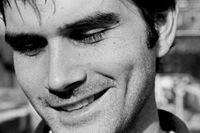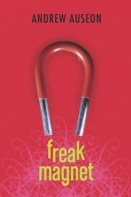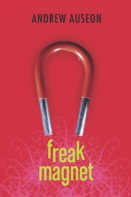 I'm thrilled to host a stop on Andrew Auseon's blog tour in support of his new novel, Freak Magnet (Amazon | Indiebound), which I posted about yesterday. His debut novel, Funny Little Monkey, was one of the first non-fantasy YA novels I read during what was still the early days, really, of the YA boom, and one of the first places I ever saw mention of a little placed called Vermont College and its YA and Children's program. He's a writer who deserves more attention, and I hope this novel finds the wide, adoring readership it deserves. Without further ado, our conversation…
I'm thrilled to host a stop on Andrew Auseon's blog tour in support of his new novel, Freak Magnet (Amazon | Indiebound), which I posted about yesterday. His debut novel, Funny Little Monkey, was one of the first non-fantasy YA novels I read during what was still the early days, really, of the YA boom, and one of the first places I ever saw mention of a little placed called Vermont College and its YA and Children's program. He's a writer who deserves more attention, and I hope this novel finds the wide, adoring readership it deserves. Without further ado, our conversation…
GB: I always start with a process question, so tell me about the writing of this novel. Did it differ from the way you've written your previous novels? Did you chant strange sayings and walk around your desk three times, etc.?
AA: There was a lot of levitation, days of it, actually. And I went through like six pointy wizard hats. (They are notoriously expensive here in the States, but across the border in Canada they’re covered by universal health insurance.) No, unfortunately, magic was not involved in the writing of this book, just the usual hours of crying, sleep deprivation, and fight club.
Freak Magnet came about unexpectedly. Early in 2006, I was feeling pretty burnt out from several high concept writing projects that had taken a toll on me creatively, and I started to wonder how to reclaim my inspiration. The strange thing was that instead of thinking big, I thought small, as in a single scene.
After months of writing outlines and having long discussions about fantasy worlds and plotlines, I was returning to what really mattered: character; or in this case: a boy with a big mouth in a café. The first scene I wrote in Freak Magnet was the opening chapter, in which the two main characters have a chance meeting on the National Mall in Washington, D.C. I think it’s a great first scene because it sets forth the tone of the whole story to come, not to mention the initial dynamic between its characters Charlie and Gloria. For me, one of the most satisfying aspects of that whole first scene is that it’s based on a true story, sort of. 
In college, I had this wonderful friend named Russ, easily one of the sweetest and funniest people I’ve ever known. (I’ve spent years trying to find him, to no avail.) One night, Russ and I attended a play at the university theater as part of an assignment for literature class. The lead actress was absolutely radiant, someone you couldn’t help but notice. A few days after that performance, Russ and I were in one our favorite college dives, and this girl walked in with her friends. She looked completely different, out of her Irish period garb and makeup, but still she was unmistakable. Well, Russ, in a fit of mad inspiration, turned to me and said, “I’m going to tell that girl that she’s the most beautiful woman I’ve ever seen.”
And he did, and I’ll never forget it. He sauntered right up to that pizza counter and politely introduced himself, and then gave her his message.
Now, in a perfect world, a person could say that and not be treated with scorn; but this isn’t a perfect world, and this girl was completely unprepared for Russ’s compliment. The whole encounter was a classic “looks good on paper” that exploded into flames upon execution. Russ never made such a mistake again.
But why wouldn’t someone want to hear a compliment like that? One of the reasons I wrote Freak Magnet was to give my old friend—and all the other good guys out there like him—the treatment he so deserved. It’s hard to put yourself out there, but sometimes the truth needs to be spoken aloud, even if it means getting kneed in the groin. (That, to clarify, did not happen. Thank goodness.)
GB: One of the things that most impresses me about this book is how absolutely distinct each first-person voice is—Charlie and Gloria will never be confused with each other. And it's such an effective way to make the reader fall in love with each of them, and also to slyly comment on how rarely we truly know what the other person in a relationship is thinking. How quickly did those voices come together for you? Did the novel start with the characters or did the idea of doing a love story come first?
AA: Wow. Thanks. I’m so glad you liked them. Charlie and Gloria were a joy to write, even when they weren’t cooperating with me, or when they were quarreling with each other.
The love story and the characters occurred simultaneously. I always intended Freak Magnet to be a story about two characters from very different backgrounds coming together, so the endgame was never in doubt. I also knew that in order to create the kind of friction I wanted, and even the moments of awkward silence, I needed two characters that would never normally associate with each other in the course of daily life—two near opposites. Half the fun of writing, and reading, a relationship like this is watching them fumble around trying to figure the other person out. That’s the story in a nutshell: clumsy groping.
Before I ever starting calling them Charlie or Gloria, I had developed pretty good sense of who my lead characters would be—their basic worldviews and insecurities. However, the specifics of their particular dysfunctions took years to evolve.
For example, I always knew that Charlie would be that guy at the coffee shop everyone wants to avoid. There’s just something about him: his interruptions, his nervous energy, and his complete lack of self-awareness. That kind of openness really makes people uncomfortable, and I knew that kind of tense atmosphere was one I wanted to explore with Charlie. I love his character, because he’s someone that only a handful of people appreciate. And that “what you see is what you get” attitude cuts both ways. So often he’s sticking himself into other people’s business, but at the same time he’s walking around extremely vulnerable.
In contrast, Gloria was always going to be the epitome of the person who finds Charlie odd, even repellent, because she doesn’t like people who wear their hearts on their sleeves. She is unable to do it, so she resents those who can. She also hates being the center of attention, preferring instead to lurk in the shadows. That gives her some small modicum of control. Charlie is out of control, and so he is constantly crashing into Gloria and rearranging her carefully laid plains. She hates that, but needs it.
One of the first tasks that my editor and I did when starting the Freak Magnet revi sions was to continue tightening the two voices to make them more distinctive. I’m glad to hear that this was a valuable effort, since the success of the entire novel rests wholly on the believability of the two main characters. Plus, it was very exciting to write in two voices, each at a different extreme on the spectrum.
As a poet, Gloria uses staccato rhythms, simple syntax, and at times even musical speech patterns. She doesn’t waste her page real estate. I like that. She says what she thinks, but often with a bit of style, or some commentary. One of the tools I use occasionally in her narration is the parenthetical. These are asides, when she chooses to add a more in-depth observation or a subjective opinion to what she’s reporting. Those were pretty amusing, because I can just imagine her giving you the facts, but then adding one last detail because she just has to. When writing Gloria, I imagined how she would write her poems and let that guide my prose.
Where Gloria used a more controlled, lyrical voice, Charlie reveled in his rambling. I wanted his way of speaking to be extremely indicative of a mind that doesn’t know when to slow down or stop. His brain is always racing, always wondering where to next direct his speeding train of thought. Writing his voice was a joyride, but, as one could probably guess, it certainly provided its fair share of challenges. We pulled back a lot of with Charlie, because his musings often lead the reader away from the focal point of the scene, and that proved distracting. I had to train Charlie, to keep him in check; but wow, was it ever fun to let his mouth off the leash. He says everything he wants to say, unfiltered. Living through him was pretty vicarious thrill.
GB: So, this is a love story, but it's a highly unconventional one. Is this in any way a response to love story tropes or does it reflect something you feel is missing in most relationship stories (and especially in YA)? Also, what's the most outrageous thing you ever did in the act of pitching woo?
AA: I would love to say that Freak Magnet is my response to YA love story tropes, but I don’t read enough YA fiction these days to feel like I have a firm grasp of what’s the norm. I wish I were so clever. My only goal in writing the book was to tell a love story that felt like it could have happened to me, or someone I knew, complete with all the idiotic gaffes, weird coincidences, and incredible moments of connection that real life has to offer. In my experience, love is a very messy business, and sometimes I feel that we idealize it so much that we skew expectations, make it out to be something that’s out of our control and thus requires nothing of us. That’s wrong. Love should be the most demanding.
I grew up during a period when romantic comedies were a pretty big draw at the box office, and those kinds of magical romances left their mark. Freak Magnet definitely possesses elements of that formula—the reliable best friends, the serendipitous encounters, etc.—but like in my previous novels, I wanted the darker parts of the story to have bite. There’s a lot of sadness to overcome in this book, a lot of rocks to sail past on your way to the beaches. I think a good example of the kind of story I wanted to tell would be the Cameron Crowe movie Say Anything. The two teens in that story are really well rounded characters with a believable collection of strengths and weaknesses, and their path to happiness leads them through obstacles, some of which you don’t see coming. The genius of that story is that the two kids are forced to grow up in order to overcome those challenges, and their newfound love is perhaps the single most important catalyst of that change. They literally could not have done it alone.
As for me, I wouldn’t say there’s one particular moment that stands out as my Gettysburg of woo. However, there was a time in my life—specifically when I was pursuing the girl who is now my wife—when I went a little crazy, did things I wouldn’t dream of doing now, either because I’m not an idiot anymore, or because that kind of mad inspiration really does strike only once, maybe twice in a lifetime. If I told you some of those things, you’d probably think I was a freak too, which I guess is the point.
GB: You're also a video game designer. How does that inform your writing or vice versa? Are the processes at all similar? Why do video games get a bad rap from so many adults?
AA: It’s a very different kind of work than writing novels. Probably the most obvious difference is that I’m part of a team, and most of the time, my words need to blend seamlessly with the words of others in my department. Everything we do is a global effort. We are creating a huge world, and all of the pieces have to fit together organically and fade into the background. Essentially, writing for games is all about enabling the player, providing a narrative within which he or she can create new, more unique personal stories—water cooler moments for nerds. With my novels, I’m able to do exactly what I want and make a mess of things. Not so with games. There are too many other people involved. Oh yeah, and gobs of money.
I’m not sure I really understand why video games get a bad rap. I think some of it has to do with the fact that many adults don’t understand what video games are, exactly, which is the same thing that happened for a long time with comics. There’s still a misconception that the bright and shiny world of the Nintendo and the Playstation is the domain of children, and not to be taken seriously. Platforms like the Wii perpetuate this myth. (All those years of flying turtle shells and glowing stars may have done every other video game a disservice.) Like any form of entertainment—books, movies, music, you name it—there is an incredible variety of video games.
Games have ratings, like just about every other form of entertainment we consume. If a child’s guardians don’t take an active role in educating themselves about what their children spend their time doing make poor decisions, then they forfeit their right to blame game developers for the results. True: Grand Theft Auto is a violent video game. Also true: no one under 18 should ever play it. Would you give your kids a Sopranos DVD and hope for a rosy outcome? I sure hope not. I am allowed to play Grand Theft Auto because I am a mature adult who is able to appreciate its rich, sprawling narrative, and because I’m a sociopath.
GB: Finally, recommend some things by other people—what have you been reading/listening to/watching/playing that you think people would be well-advised to check out.
AA: I am woefully out of touch with what’s cool. Maybe that makes me a freak, like Charlie. I exist almost completely inside a bubble, often yanking in my wife and two daughters to join me when I have something interesting to say, like, “Where are my keys?” or “What did you do with your diaper?” And like everybody else out there, I’m insanely busy. I don’t think I even remember what it’s like to have interests. But let me give it a shot.
After years of procrastination, my wife and I have finally gotten around to watching “Buffy the Vampire Slayer,” which has been a lot of fun. It’s a show that carries so much baggage in the form of hype, that I have trouble coming at it objectively. Luckily, it’s really clever and weird and funny.
I listen to a lot of music, but it’s mostly while I’m writing, so I tend to avoid lyrics as hey can cause brain-lock. I usually gravitate toward atmospheric music, post-rock artists like Sigur Rós, Hammock, and the Album Leaf, or electronic musicians like Ulrich Schnauss. If there was one album, or collection of music I’ve spent a lot of time listening to recently, it’s probably the original soundtrack to the TV show “LOST,” by Academy Award-winning composer Michael Giacchino. The guy’s a genius, and the melodies are too simply gorgeous for words.
When I’m not working, I try to play games, and I usually prefer board and card games to the electronic variety. The card games “Dominion,” “Bang,” and “Race for the Galaxy” are all excellent. One of the more fun board games I’ve played in recent weeks has been “The Adventurers,” which is inspired by old adventure heroes like Indiana Jones and Allan Quartermain. You explore an ancient temple, trying to survive long enough to escape with a bag full of treasures… and your life. It’s a great game for kids too, because there are all sorts of little contraptions and components—a wall that closes in on you, a giant rolling stone, and a pit of lava. Get your white-knuckle thrills!
As a parent of young children, I don’t get to read nearly as much as I would like to, at least not novels. However, there are advantages to having toddlers and kindergarteners, namely kid lit! My favorite author is Cynthia Rylant. Her work is just amazing, and if you have daughters, the “Cobble Street Cousins” series is a must, as is “Mr. Putter and Tabby.” For the older set, I would recommend the Scott Pilgrim graphic novels by Bryan Lee O’Malley (I cringe when calling them graphic novels, because they are nothing like classics such as Watchmen or From Hell). They’re not high art, and O’Malley really needs to learn to draw another face, but he perfectly captures the strange vagrant lifestyle of your early twenties. Plus, he does some really interesting things with integrating video game culture with traditional narrative. It’s unique, and pretty ridiculous. I haven’t been neglecting novels altogether. I devoured George R.R. Martin’s “Game of Thrones” fantasy series, completely riveted from start to finish. I’m not normally into fantasy, but Martin’s books are a juicy combination of courtly intrigue, bawdy sex, violent combat, and peculiar characters. They’re making a long-running HBO series, so you know it has to be pretty damn good.
Okay, I think it’s been established that I talk way too much. So I will make my exit. Thanks so much to Gwenda for hosting me on Shaken & Stirred today, and I hope everyone has a chance to check out Freak Magnet. Later!

You can find out where the next stop on Andy's blog tour is at his own blog—and, like I already said, pick up this book.




![Holly_black-whitecat2[1]](https://www.gwendabond.com/wp-content/uploads/2015/02/6a00d8341bf99653ef013484ed01a2970c-200wi.jpg)